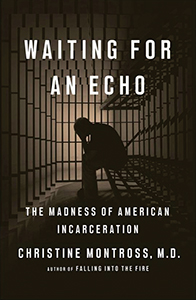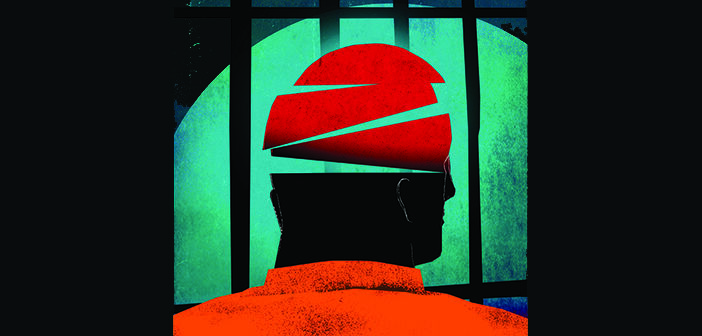What happens when people with mental illness are sent to jails instead of hospitals?
My medical expertise is in mental health. And what I found once I began working in the prisons was a system that runs counter to every principle of human flourishing that I know. Incarceration in America routinely makes mentally ill people worse. And just as routinely it renders stable people psychiatrically unwell. Our system is quite literally maddening—a truth that undermines our stated goals of safe and secure communities.
 The trajectory of my patients’ lives veers sharply when law enforcement is involved. The consequences of these interactions are unpredictable. If psychiatrically ill people are sick enough or afraid enough to be potentially assaultive, the earliest decision by police as to whether they belong in jail or the hospital—a decision often made in the moment of the police encounter—may shape the course of the next many years of their lives. When the outcome is hospitalization or access to treatment, the result can be stability and safety. But when mentally unwell, dysregulated people are taken to jail, the result can be sheer disaster.
The trajectory of my patients’ lives veers sharply when law enforcement is involved. The consequences of these interactions are unpredictable. If psychiatrically ill people are sick enough or afraid enough to be potentially assaultive, the earliest decision by police as to whether they belong in jail or the hospital—a decision often made in the moment of the police encounter—may shape the course of the next many years of their lives. When the outcome is hospitalization or access to treatment, the result can be stability and safety. But when mentally unwell, dysregulated people are taken to jail, the result can be sheer disaster.
Some years ago I evaluated a jailed man named Henry. Henry was thin and disheveled, and he looked at me with guarded suspicion when the correctional officer brought him into the room where I was already seated. He was wearing a khaki prison jumpsuit with a white T-shirt underneath—and he smelled as if he had not showered in many days. I immediately noticed that Henry’s mouth was in constant motion with the involuntary movements of tardive dyskinesia, a rare but permanent side effect that can be caused by long-term use of antipsychotic medications.
Henry had been paranoid at the time of his arrest, and his paranoia had not abated in jail. He was refusing to speak to his attorney, prompting the judge to order a competency evaluation.
According to the police report, Henry’s legal involvement began when he did not leave the premises of a convenience store after the manager instructed him to. Henry hid behind the store’s dumpster, refusing to come out when approached by police, and shouting paranoid statements about interrogation tactics and torture and the Connecticut militia. When he finally emerged, Henry was taken to jail. His charges—criminal trespass and resisting arrest—carried a maximum combined sentence of two years in prison.
But Henry’s situation, like that of many psychotic detainees, became far more dire. Henry was prescribed an antipsychotic medication in jail but refused to take it. He might have been paranoid about the pills’ safety or might not have had insight into the fact that he needed treatment. At some point shortly after his arrest, he would not come out of his cell when asked to do so. He was then forced out by correctional officers—a procedure called a “cell extraction.” Still paranoid, but now with no dumpster to hide behind, Henry resisted this time by fighting back.
In our nation’s correctional facilities, detainees who become assaultive are typically sent to administrative segregation—a punitive form of solitary confinement known to exacerbate symptoms of mental illness. Worse still, assaulting a correctional officer is a felony charge, which in Henry’s state carries a maximum sentence of fifteen years in prison and a fifteen-thousand-dollar penalty. If convicted, Henry would spend years in prison, where mentally ill people face a disproportionate risk of being victimized. He would eventually leave prison on probation, with legal requirements that would be difficult for him to manage if his symptoms return—setting him up to incur additional time behind bars.
Compare Henry’s situation to that of Robert, a psychotic man who caused a similar disturbance in the community. Robert, too, was plagued by paranoid delusions. He had come into contact with police while yelling loudly in the streets of his neighborhood that he was an unwitting experimental subject in a secret government program. But unlike Henry, Robert was admitted to my inpatient unit after police decided to bring him to the hospital rather than to jail.
Like Henry, Robert refused to take prescribed antipsychotic medication. As a result his paranoid symptoms had improved little since admission.
One night new personnel were being trained on the hospital ward. Robert was in the kitchen when a staff member began demonstrating how, in case of an emergency, electronic safety blinds could be activated to cover over the wall of windows that separated the kitchen from the rest of the unit. Robert became terrified by the movement of the security blinds and, in the throes of his paranoia, interpreted their closure as a signal. He believed that the unit staff was cordoning off the kitchen in preparation to execute the patients held within.
Robert ran out of the kitchen, screaming to the other patients, “Tonight’s the night they’re going to kill us all!” In what he believed was self-defense in a moment of mortal peril, he began attacking the staff. In less than a minute, he assaulted and injured numerous staff members. Two female mental-health workers suffered concussions, one of them hit so hard by Robert that her supervisor later said that “she flew off her feet like a rag doll.” A male staff member who intervened and tried to subdue Robert was brought to the floor by him, kicked in the head, and eventually required knee surgery for injuries sustained in the altercation.
Despite the severity of the attack, none of the injured workers felt that it was appropriate to press charges. They each offered the same explanation: Robert was clearly ill and had been acting out of his illness. He inflicted an enormous amount of damage, but no one perceived him to have done so with malicious intent. As the unit’s nursing supervisor said to me in describing Robert’s aggression, “He was in pure terror. He thought he was fighting for his life.”
Robert eventually began taking appropriate medications, and his paranoia diminished. After fifteen days he was discharged home with outpatient treatment arranged by the hospital team. Henry, in contrast, remained incarcerated, facing the prospect of spending the next decade and a half of his life in prison.
Henry’s story is not an aberration. I have met countless detainees who face significant time in prison for just these sorts of circumstances. In precisely this way, our jails have become an integral part of our mental healthcare system—an unjust and inhumane practice, for which we all pay the price.
Excerpted from Waiting For An Echo by Christine Montross, published by Penguin Press, an imprint of Penguin Publishing Group, a division of Penguin Random House LLC.




